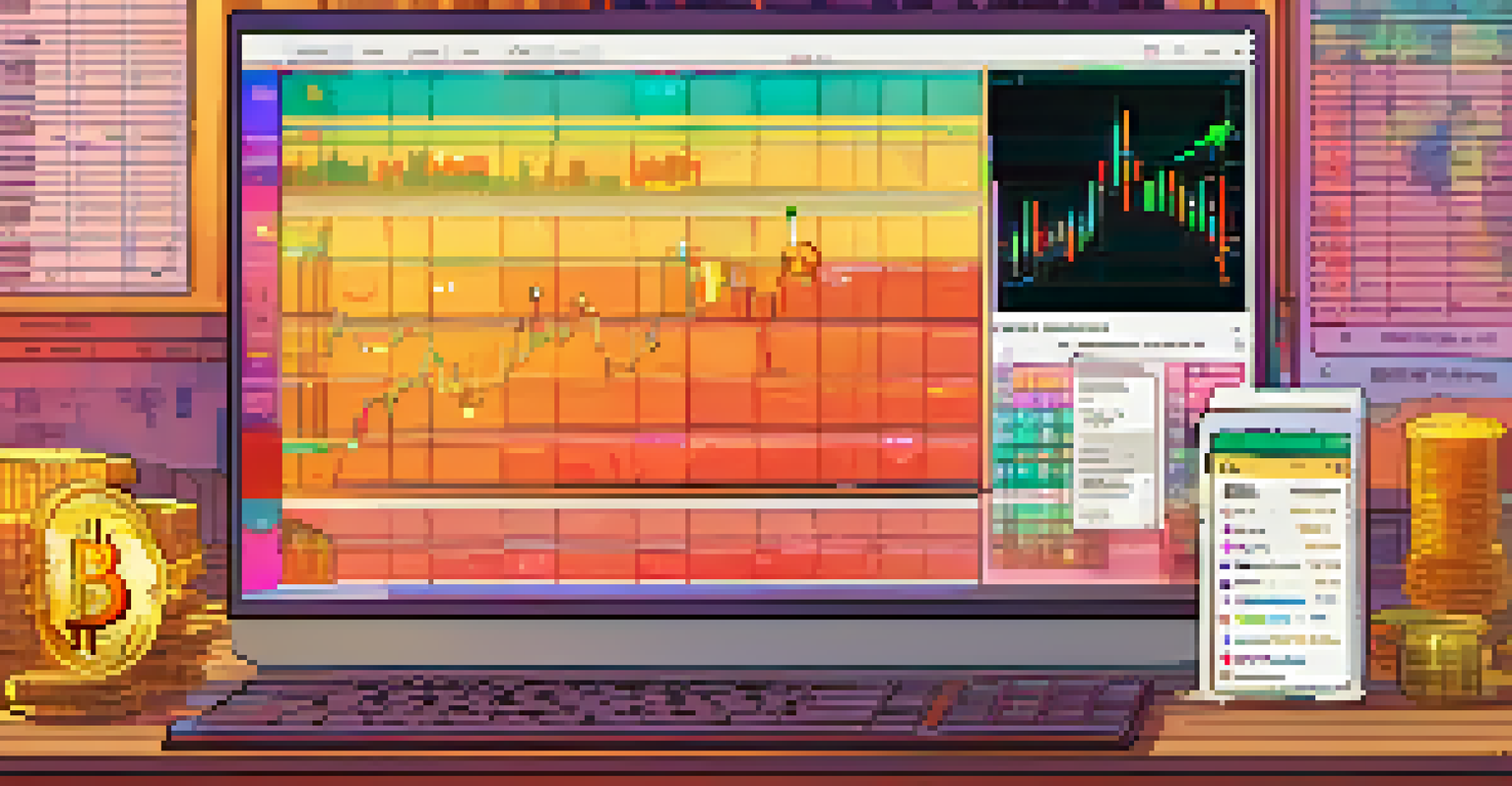Decentralized Exchanges: A New Era of Financial Independence

What Are Decentralized Exchanges and How Do They Work?
Decentralized exchanges (DEXs) are platforms that allow users to trade cryptocurrencies directly with one another, without the need for a central authority. This peer-to-peer trading model uses smart contracts—self-executing contracts with the terms written into code—to facilitate transactions securely. By eliminating intermediaries, DEXs promote greater control over funds and lower fees, making trading more accessible to everyone.
Decentralization is the future of finance, allowing individuals to reclaim their financial sovereignty.
Imagine a bustling marketplace where buyers and sellers interact freely, without a middleman dictating prices or controlling inventory. That's the essence of a DEX! Users retain their private keys and are responsible for their funds, which enhances security and reduces the risks associated with hacks that can occur on traditional exchanges.
In essence, DEXs are reshaping the trading landscape by offering a transparent and user-centric approach. As more people seek financial independence, understanding the mechanics of DEXs becomes crucial for anyone interested in the cryptocurrency market.
The Benefits of Using Decentralized Exchanges
One of the most appealing benefits of DEXs is the enhanced privacy they offer. Since users trade directly with one another, there’s no need to provide personal information, unlike centralized exchanges that require extensive KYC (Know Your Customer) processes. This anonymity can be a significant advantage for those who value their privacy in financial transactions.

Additionally, DEXs often feature lower trading fees compared to their centralized counterparts, as there are fewer overhead costs involved. Without the need for middlemen, users can save on transaction costs, making trading more profitable. This cost-effectiveness is particularly attractive for regular traders and those looking to maximize their investment returns.
Understanding Decentralized Exchanges
Decentralized exchanges allow peer-to-peer trading without intermediaries, providing users greater control and lower fees.
Moreover, DEXs operate 24/7, allowing users to trade whenever they choose without being restricted by business hours. This flexibility aligns perfectly with the fast-paced nature of cryptocurrency markets, where opportunities can arise at any time.
Challenges Faced by Decentralized Exchanges
Despite their many advantages, DEXs are not without challenges. One major concern is the potential for lower liquidity compared to centralized exchanges. Liquidity refers to how easily an asset can be bought or sold without affecting its price. A lack of liquidity can lead to slippage, where the execution price of a trade differs from the expected price, which can be frustrating for traders.
The internet is about freedom, and decentralized finance is the embodiment of that freedom in the financial world.
Another challenge is the complexity of using DEXs, especially for newcomers. Navigating wallets, understanding gas fees (the cost to execute transactions on the blockchain), and managing private keys can be daunting. This steep learning curve may deter some users from fully embracing decentralized platforms.
Furthermore, DEXs often lack customer support, which can be a drawback for those who encounter issues during trading. Unlike centralized exchanges that typically have dedicated support teams, users of DEXs may have to rely on community forums or documentation for assistance.
The Rise of Automated Market Makers (AMMs)
Automated Market Makers (AMMs) are a groundbreaking innovation within the DEX space that uses algorithms to set prices based on supply and demand. Rather than relying on order books like traditional exchanges, AMMs utilize liquidity pools—collections of funds provided by users—to facilitate trades. This model allows users to trade instantly without waiting for a counterparty.
Think of AMMs as a digital vending machine for cryptocurrencies. You deposit your tokens into a pool, and in return, you can withdraw other tokens from that pool at any time, based on the current pricing algorithm. This not only simplifies the trading process but also enables users to earn rewards for providing liquidity.
Benefits of DEXs for Traders
DEXs offer privacy, lower trading fees, and the flexibility to trade 24/7, making them appealing to cryptocurrency enthusiasts.
AMMs have gained immense popularity, with platforms like Uniswap and SushiSwap leading the charge. By making trading more accessible and efficient, AMMs are reshaping how we interact with decentralized finance.
How Decentralized Exchanges Promote Financial Independence
Decentralized exchanges empower individuals by giving them complete control over their funds, an essential aspect of financial independence. Users can trade, stake, and invest without relying on a centralized entity, which often has its own agenda and policies. This autonomy allows traders to make informed decisions based on their own research and risk tolerance.
Moreover, DEXs enable users to access a wider variety of tokens that might not be available on traditional exchanges. This inclusivity fosters innovation and provides opportunities for investment in emerging projects, thus democratizing access to financial markets.
As people continue to seek alternatives to traditional banking systems, DEXs symbolize a shift toward a more decentralized financial ecosystem. This movement encourages individuals to take charge of their financial futures and explore new avenues for wealth creation.
Security Considerations in Decentralized Exchanges
When it comes to security, DEXs have their pros and cons. On one hand, users maintain control of their private keys, significantly reducing the risk of hacks that plague centralized exchanges. However, the responsibility of securing those keys lies entirely with the user, making it crucial to understand best practices for safeguarding digital assets.
It's also worth noting that while DEXs are generally more secure, they are not immune to vulnerabilities. Smart contracts, which underpin their operations, can contain bugs or exploits that malicious actors might take advantage of. Therefore, it's essential to use reputable DEXs that have undergone rigorous audits.
Challenges of Using DEXs
Despite their advantages, DEXs face issues like lower liquidity, complexity for newcomers, and lack of customer support.
Educating oneself about security practices—like using hardware wallets for storing private keys and enabling two-factor authentication—can help mitigate risks. Staying informed about potential threats can empower users to trade with confidence.
The Future of Decentralized Exchanges in Finance
The future of decentralized exchanges looks promising as more users recognize the benefits of greater autonomy and security in their trading practices. As technology continues to evolve, we can expect to see improvements in liquidity solutions, user interfaces, and the overall trading experience. Innovations like layer-2 solutions could address current scalability issues, enhancing the functionality of DEXs.
Moreover, regulatory frameworks are slowly catching up with the rapid growth of decentralized finance. As authorities begin to understand DEXs better, we may see clearer guidelines that protect users while promoting innovation. This balance will be crucial for the sustainable growth of the DeFi ecosystem.

In conclusion, decentralized exchanges are paving the way for a new era of financial independence. By embracing this shift, individuals can take control of their financial journeys and participate in a more inclusive financial landscape.